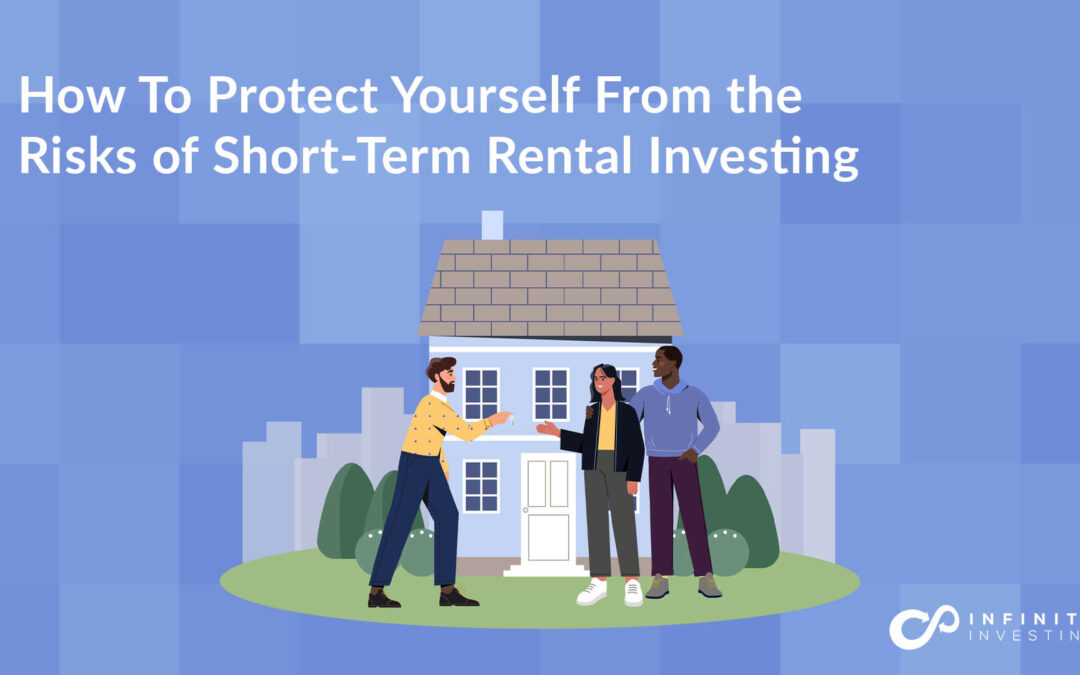
Short-term rentals can be an excellent investment with the right planning and risk mitigations in place. Risk management with short-term rentals involves predicting potential risks, ensuring sufficient coverage, and learning the top strategies to maximize your profits. Learn why short-term rentals are an excellent investment, explore the most common risks, and discover how to protect yourself from them.
Key Takeaways
- Short-term rentals offer many advantages, including higher earnings and flexible scheduling opportunities.
- Common risks of short-term investing include lack of bookings and damaged property or personal belongings.
- Ensuring you have sufficient insurance to protect your guests and property is crucial when owning a short-term rental.
- Structuring your real estate assets into an LLC can help protect your assets and personal finances.
- Planning early for taxes can help you prepare and minimize your taxable liability through qualified deductions.
- Sign up for Infinity Investing’s 360 Pro membership to unlock even more tips on obtaining financial freedom through short-term real estate investing.
Why Invest in Short-Term Rentals?
Investing in short-term rentals offers many advantages over long-term rentals, including:
- Higher earnings: You can usually charge short-term rental guests more than long-term guests are willing to pay. Rentals in tourist areas or big cities tend to have higher per-night averages than rentals in long-term residential areas.
- Flexible scheduling: You can control who uses your property and when with a short-term rental. You can even exclude specific dates or weeks to use the property for your own vacation or travel needs.
- Tax benefits: Short-term rentals offer many tax advantages. You can reduce your taxable income by writing off your mortgage interest, furnishing costs, and property management fees in the form of deductions.
- Ongoing maintenance: When you own a short-term rental, you can access your property every few days or weeks. This means you can keep up with maintenance tasks before they get too expensive.
You can usually profit through short-term rentals as long as you maintain consistent bookings and high guest satisfaction. If the demand for short-term rentals decreases, you also have the option to convert the asset into a long-term rental.
Infinity Investing Featured Event
In this FREE event you’ll discover how the top 1% use little-known “compounders” to grow & protect their reserves. Our Infinity team of experts show you how to be the best possible steward of your finances and how to make your money and investments work for you instead of you working for them. Regardless of your financial situation today, you’ll have a road map to get to where you want to be.
Risks of Short-Term Rental Investing
Before reviewing some of the best risk mitigation strategies for investing in short-term rentals, learning about the most common risks can be helpful. Short-term rental investing is prone to the following risks:
- Lack of bookings: You may have to put more into marketing to ensure your property is booked regularly. Unlike long-term rentals, you’ll need many more guests to earn a profit. Choosing a property in an in-demand area is essential with short-term rentals.
- Damaged property: Because you welcome more guests in a short-term rental, there may be an increased risk of damaged property.
- Higher upfront costs: You’ll have to prepare your home for short-term guests with furniture, appliances, bedding, and decor. The good thing is you can recoup these costs later through higher per-night rentals.
- Frequent maintenance: With the constant influx of guests coming and going from a short-term rental, you may have more maintenance needs.
- Ongoing cleaning: You’ll have to schedule a cleaning company to clean your short-term rental between guests. If your cleaning company is late or doesn’t show up, you may be unable to rent the property that night.
- Zoning changes: Some cities have made zoning law changes that limit the number of short-term rentals allowed in an area or the minimum number of nights allowed.
Short-term rentals require ongoing cleaning and furnishing, which isn’t usually the case with long-term rentals. However, you can account for these costs when setting your nightly rate.
Protect Yourself From Short-Term Rental Investing Risks
Investing in short-term rentals can be profitable as long as you know the most common risks and how to minimize their impact on your bottom line. Choosing a property in a highly desirable area is a great first step to investing in real estate, but it’s not all you can do. Here are a few of the top risk management strategies for short-term rental investing:
Ensure Sufficient Insurance Coverage
Insurance requirements aren’t always clear when it comes to short-term rentals. If you rent your property through a third-party site, like Airbnb, it may have a built-in insurance policy. However, it’s crucial to review what this covers and any gaps that may be present. If you purchase your own insurance policy, you’ll want to check that it covers business purposes. Not all homeowners insurance policies cover rentals.
Make sure your insurance policy not only covers the asset itself but also your personal belongings. With so many guests checking in and out of your property, it can be difficult to keep track of furnishings within the home. Take inventory and photographs of all items in the home so that you can easily track and report stolen items. Your insurance policy should also cover bodily injury, protecting you from a guest being injured on your property.
Structure Your Assets Properly
Structuring your real estate assets, whether short or long-term, is also essential to protect yourself. A limited liability company (LLC) protects your personal finances from professional ones. Structuring different real estate assets into different LLCs can also protect the liabilities of one from the liabilities of the others. LLCs also offer short-term investors tax benefits and peace of mind.
Diversify Your Real Estate Assets
Diversifying your investments is a great strategy to minimize risk. When you’re ready to expand your real estate investment portfolio, consider diversifying to a new area to minimize risks. That way, if local zoning laws change or the city implements new rules on short-term rentals, only one of your properties will be at risk.
You might also consider diversifying to a long-term rental or even mobile home investing. The more you spread the risk, the less likely a market change or risk factor will affect your success.
Set Clear Screening and Guest Rules
You typically have more control of your property with a short-term rental than you do with long-term renters. It’s always a good idea to screen potential guests as much as possible. Review their profile or get to know them before scheduling their booking.
Then, set clear guest rules to improve safety for everyone. This might include prohibiting lighters or fire pits while renting or not allowing more than a certain number of guests to stay at one time. Some investors may also set quiet time, which prevents guests from hosting parties.
Charge a Deposit
Security deposits may be even more critical with a short-term rental than a long-term one. You may not have as much information available about short-term renters, which can make renting to them slightly riskier. A security deposit helps protect your assets by providing you with the funds you need to make repairs in case a short-term tenant causes extensive damages.
Have an Emergency Plan
An emergency plan for guests and your home can also help mitigate risks. Provide guests with clear instructions on how to use appliances or safety equipment. Ensure guests have access to a first aid kit and phone numbers of nearby hospitals. Inform them of what they should do and who they should contact in the event of an emergency.
Make sure your short-term rental is equipped with fire and carbon monoxide alarms. You might even invest in smart appliances or locks to ensure guests turn off the kitchen appliances or lock the doors when leaving.
Choose the Right Property Manager or Booking Company
The key to earning a profit with short-term rentals is to schedule as many bookings as possible. Untimely or unresponsive property managers or cleaning companies can limit the number of guests you welcome into your short-term rental. If you don’t live near enough to your short-term rental, hiring a property manager to oversee all contractors may be worth it.
A rental management company can also help you price your short-term rental competitively. Depending on where you invest, you may need to adjust prices between seasons, and an experienced company or property manager can provide you with valuable insight and guidance.
Plan for Taxes
All revenue is subject to taxes, including any earnings you receive from a short-term rental. Keep clear, detailed books so you’re better prepared for tax season. Keep receipts for any expenses, including maintenance, repairs, or furnishings. Some investors may choose to pay taxes throughout the year through estimated quarterly payments, which can reduce your taxable liability come tax season.

Sign Up for Our Paid Membership Today
Are you ready to learn how short-term investing in real estate can help you meet your financial goals? Whether you’re already invested in real estate through other methods or new to short-term rentals, we have the resources you need to choose the best investments and maximize your returns. Sign up for our 360 Pro membership today to access the tools and resources you need to unlock financial freedom.
Infinity Investing Featured Event
In this FREE event you’ll discover how the top 1% use little-known “compounders” to grow & protect their reserves. Our Infinity team of experts show you how to be the best possible steward of your finances and how to make your money and investments work for you instead of you working for them. Regardless of your financial situation today, you’ll have a road map to get to where you want to be.

